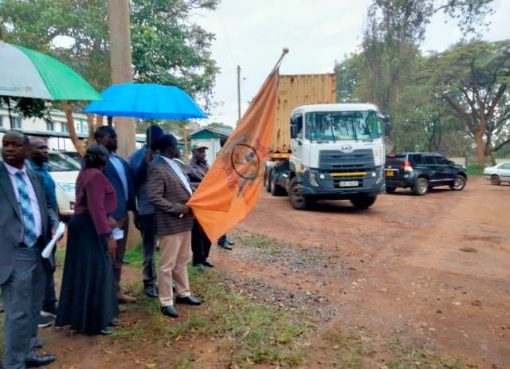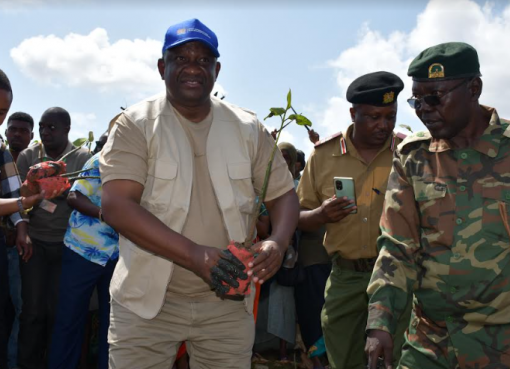Coffee farming has in recent years turned out to be a nuisance among many farmers.
The development has largely been attributed to the fluctuating and inconsistent world prices hence dealing a blow to the morale of farmers who are on the receiving end.
This year however, coffee production in Kirinyaga County has improved to 40 million kilograms of cherry during the just ended season up from 28 million kilograms in the previous season.
The Small scale farmers who are the majority in the county said despite the prolonged drought that prevailed last year, they still managed to produce good yields.
The County Executive for Agriculture, Jacqueline Wanjiku says that good crop husbandry the farmers applied led to the high yields of the cash crop.
“As an agricultural department , we have deployed extension officers in all the 20 Wards who train our farmers on the best crop husbandry procedures whose results are high yields and high quality farm products,’’ she said.
Wanjiku says from the increased yields, farmers have resultantly earned more than Sh. 15.8 billion from the sale of the crop this season.
The CEC said the largest chunk of the money went to Baragwi Farmers’ Society in Gichugu who had the best coffee in terms of production and quality.
“The big success is as a result of the improved extension services and the right cherry processing procedures adopted by many of the coffee societies in Kirinyaga,” she stated.
“Our governor, Madam Ann Waiguru has always been resolute that extension officers must be with the farmers on the ground, another thing which has improved the sector,” she said.
Coffee production would have been better were it not for the harsh cold weather conditions which prevailed in most parts of the county.
Wanjiku said the County has also taken the initiative to boost coffee farming by planning to avail coffee seedlings which the farmers can collect from many of the coffee societies in the county.
The County Government will also collaborate with the National Government in distribution of subsidised fertiliser to farmers in the area, including rice and coffee farmers.
A farmer, Bernard Kathanga whose coffee farm is said to be among the best well managed says the high cost of inputs in the sector was a discouragement to many of the small scale farmers.
He says were it not for the high costs of such inputs, coffee production could even be doubled within the next few years.
“Most coffee farmers are unable to apply the right crop husbandry due to the high cost of inputs and it is my wish that the government will soon start availing subsidised inputs if this sector is to get back to where it was in the yesteryears,’’ he said.
He explained that this was why farmers support the coffee sector reforms which among others seek to increase farmers’ earnings by getting rid of unscrupulous cartels who have been taking advantage of the farmers.
The reforms seek to enforce that farmers start receiving 80 per cent of gross earnings while their co-operative societies, millers and marketers will share the remaining 20 per cent if Parliament approves the new regulations.
‘’Unless the government gets rid of the cartels in the sector farmers will continue to work so hard but end up not benefiting from their hard work ,’’ Kathanga said.
He said the chain of middlemen right from the production stage to the marketing was too long and farmers were feeling strained.
Julius Muriithi of Mwirua Coffee Society says illiteracy and lack of enough knowledge about good coffee farming
procedures is the main reason for poor coffee grades and quality that contribute to poor coffee payments.
He said to overcome that, they came up with a plan to help farmers get out of this widespread dilemma.
“We developed a strategy and came up with educative coffee forums in specific villages in the catchment area. This was in a move to ensure that every farmer and member of their factory is well-versed with proper coffee management skills to improve returns,” he said
Murithii said they also engaged an agronomist, Peter Nyamu whose work is to reach every coffee farmer in the respective society in order to educate them on good coffee management procedures and farming habits.
“Farmers at the beginning thought it was expensive to hire the agronomist but they have since seen the end result with their yields and earnings scaled up,” he said.
Here, every coffee farmer is invited to gain knowledge and information regarding coffee farming with the help of the society’s agronomist. This forum also provides a chance for the farmers to share their experiences in coffee farming.
The agronomist takes them through printed brochures that contain correct fertiliser and manure application all through the year. He also critically spells out and cautions the farmers on the bad coffee farming habits that ruin good harvests and grades.
Farmers are also provided with well printed brochures that provide guidance on annual coffee management process.
This is a very positive initiative in ensuring successful coffee farming and thus it poses a challenge to every
stakeholder in the coffee sector to seek knowledge and good management skills from experts in order to improve the coffee sector.
The coffee industry contributes about Sh 20billion to the economy annually with over 700,000 smallholder farmers and 3,200 estates spread across 31 counties where the crop is grown.
The Government recently set up a Sh.3 billion Cherry Advance Revolving Fund to be operational from July 1, 2019.
Consequently, all coffee farmers across the country will be able to access the money at a modest interest rate of three per cent.
Land under coffee has declined in the past two decades from 170,000 hectares to 108,000 and production declined from 128,926 tones to about 40,000 tones.
Only three per cent of processed coffee is consumed locally, with the rest being sold in the international markets.
The cost charged by co-operative societies to growers for pulping, factory expenses, transportation, milling, warehousing, breakage and any other expenses shall be as per the societies’ budget but shall not exceed 20 per cent of the gross earnings from coffee sales.
In a classic government move, the regulations introduce layers of bureaucracy which, according to the drafters, are aimed at ensuring that there is accountability and a paper trail.
The regulations introduce several licenses. The county government will issue four licenses, including those for coffee nurseries, pulping, milling and roasting.
The Agriculture and Food Authority (AFA) will issue commercial millers’ licenses, for warehouses, coffee liqueur, cupping laboratory and coffee traders. Some of the licenses will be targeted at the youth.
Licenses shall expire on June 30th of every year and holders wishing to renew them may apply by June 1 preceding the expiry of the license, the regulations provide.
They obligate AFA to keep a data base and disseminate information on the coffee industry as well as establish linkages with various government agencies and research institutions.
County governments will offer extension services and primary coffee processing in collaboration with law enforcement agencies.
They will also monitor and report incidences of pests and disease outbreaks and take appropriate action in collaboration with AFA and other relevant government agencies.
The regulations also mandate every county government to register all coffee growers in their areas.
In addition, county governments shall maintain up-to-date registers of all coffee co-operative societies, associations, estates and nursery operators and share the information with the authority.
A person shall not move coffee or cause any coffee to be moved without an original moving permit issued by the licensing authority.
The licensing authority shall monitor the movement of parchment coffee between stores and the movement of clean coffee and hulled mbuni to the market in order to ensure that the coffee is safe and to avoid any illegal dealings.
The regulations also call for audits of all coffee cooperatives societies to check whether they are economically viable and to make suggestions on how to strengthen them.
By Irungu Mwangi



